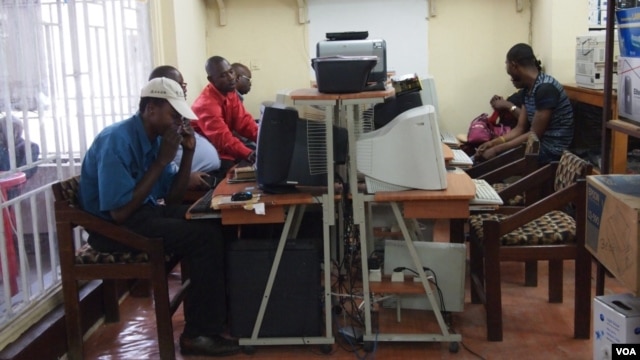by ALPHONSE NEKWA MAKWALA and TRESOR MAKUNYA MUHINDO
 Locals surf the web at an Internet cafe in Kinshasa, Democratic Republic of Congo. PHOTO/Nick Long/VOA
Locals surf the web at an Internet cafe in Kinshasa, Democratic Republic of Congo. PHOTO/Nick Long/VOA
GOMA – While the Congolese government was keeping the public in the dark about the fall of Goma to the M23 rebels in mid-November, here the news had already gone viral on Facebook.
Soon after the rest of Congo was checking in on a variety of social networks to follow news updates and the latest photos coming out of Goma, the capital of the war-torn North Kivu region. On the other side of the country, a young man sitting in a cyber café in the city of Matadi, could shout out “Goma has fallen!” And if no one believed him, he could say: “Come see the photos…”
Over the past four years, the number of Congolese active on social networks – particularly Facebook – has multiplied many times over, thanks both to Internet cafés and the arrival of smartphones. On these networks, they can share photographs, information, meet their friends’ friends and build new networks.
For less than $1, cellphone companies now offer 24-hour Internet deals. The country is going through a real “information rush.”
Everyone wants to be the first to post breaking news on his or her Facebook wall. “Every time that something happens near me, using my cellphone I rush to be the first to publish something about it on my wall to inform people,” says Bruno Ndombe from Matadi.
Students are totally addicted. “I can’t spend more than two hours without checking my page. This allows me to instantly answer my friends’ messages,” explains Feza, an economics students at the Free University of the Great Lakes Countries (UFPGL) in Goma.
“With globalization, not having a Facebook account would be crazy,” says Pierre Busime from the same university.
Citizen reporters
Many Congolese are joining the ranks of citizen reporters around the world. Thanks to their smartphones, they take photos; record video or sound; write texts and share them on social networks. They are the first to inform others about what is happening around them. It allows some to make money as well.
“Because they were at the right place at the right time, many are able to sell their videos or photos to media outlets, who do not have the images yet,” explains Cedric Kalonji, a journalist specialized in new media. But this information is sometimes unreliable, or even unethical.
A Facebook user from Goma posted false information on Nov. 16 when he wrote “M23 rebels are already in Goma and the North Kivu governor has left for Bukavu.” The rebels only entered the city two days later.
On other Facebook accounts, there are horrifying photos. One photo shows a close-up of a pregnant woman, naked, gagged, on a makeshift operating table. There are also many photoshopped images, defamatory posts, insults, and threats.
Difficult to regulate
The Congolese government has begun to try to monitor activity online. “If the country had a fiber optic connection, it would be easier to control the use of social networks, especially Facebook,” says a communication specialist from Goma.
Dieudonné Byaombe, a lawyer, disagrees. “This would go against the constitution, which advocates freedom of speech for all. This implies the freedom of expressing one’s opinion and beliefs, written, oral or through images, on condition that it respects the law and public order.”
Safari Muhonde, a sociologist from the University of Bakuvu, urges Internet users “to be responsible and avoid publishing content that could threaten the nation.”
Journalists also need to use social networks to make the most of globalization, says Cédric Kalonji. “Otherwise, they will be replaced by young people who have already mastered new information technologies.”
